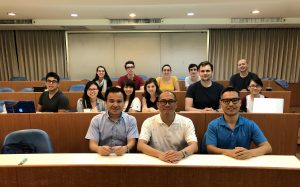The Entrepreneurship and Human Resource Management class welcomed guest lecturer Jacky Kuo. Kuo’s experience includes serving as the head of BU at Acer and Wistron. Currently he works as a corporate venture capitalist and senior consultant at Wistron. Kuo began his lecture by asking students to play two games. The first game required students to make two rows with eight coins initially set in a cross form. The second game was using four lines to connect nine dots. The point Kuo wanted to make was about out-of-the box thinking in innovation and entrepreneurship. It is very hard to start up your business, and 80 to 90 percent of most startups will fail in the first phase of the life cycle. There is a Chinese saying, “It is hard to find a born businessman.” Kuo also discussed the financial life cycle of a startup: FFF & Angels, venture capitalist, and investment banks.
Jacky presented several case studies representing various start up successes and failures. One case was about a watch-like device which sends pulses imitating a metronome. The founders did not have any technological knowledge about their product besides some knowledge about its applications for musicians. It is important for a founder to not only focus on one aspect but also learn about other aspects. Having a passion for the product or service and having the drive to make the product perfect are important factors for an entrepreneur.
A failure discussed was technology startup Furbo, which offered a device that allowed people to communicate with their pets from a distance and remotely feed them. However, the technology was not aligned to the business model. Another case which failed was an automatic water tank for cats. The financial picture was not good, and there were high financial costs due to technological complexity. The founder attended too many PR activities and monopolized the decision-making process. Another important mistake, during the “valley of death” – the beginning stage of startups – the founder borrowed money from an investor in China. This debt coupled with the overly-complex technology eventually led to the product failing.
Contrastingly a similar startup, Smartfeeder, was less complex in technology. The cost was also much lower and product was very popular in the US. Bolstered by a good business model and business alliances, this product found considerable success.
The last case presented was concerning food technology. Nomiku, a smart cooker, uses the sous vide method of cooking food. Food is placed in a vacuum-sealed bag in a controlled low-temperature water bath. Just by taking a picture of the food, Nomiku knows the proper cooking method. The founder persuaded investors that the smart cooker would be as popular as the microwave oven, one of the most successful products in history.
For entrepreneurs and investors, it is important to have a prototype for progress. Assembling a solid and dedicated team is also of paramount importance. Investors will look at whether or not the team behind a product has dedication and integrity. The success of a new invention or product must be the result of great thinking, careful planning, and smart investing.
